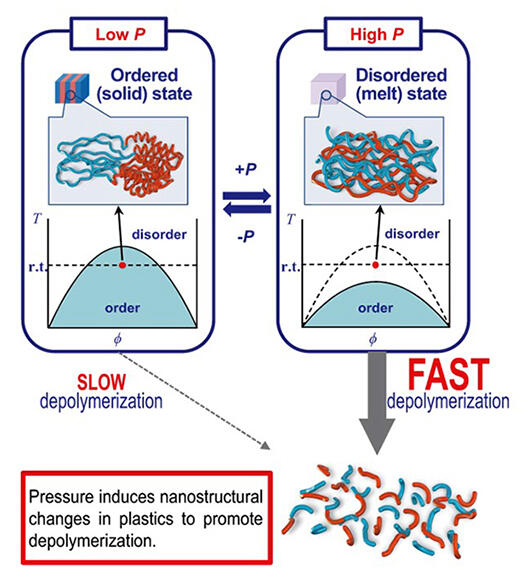The Japan Agency for Marine-Earth Science and Technology (JAMSTEC) , Kyoto University, Kyoto Institute of Technology , and Shizuoka University have signed a joint research agreement to develop sustainable plastics that can be freely broken down on demand using pressure as a switch.
Chemical recycling, in which waste plastics are depolymerized into their constituent monomers and oligomers, and then re-polymerized back into plastics, is the most essential and effective solution to achieve true resource recycling of plastics. However, in order to realize chemical recycling, it is necessary to innovate plastics to have both "stability" and "degradability," two completely contradictory functions. One issue is that chemical depolymerization, the opposite of polymerization, which has been the subject of vast research, has not progressed very far. The Chemical Sciences and Society Summit white paper published in June 2020 also positions chemical depolymerization as an important new field for future methodological, theoretical, and process development.
As such, the joint research will use high-pressure technology developed in deep-sea research to develop sustainable plastics that can be freely broken down on demand using pressure as a switch. In order to realize efficient chemical recycling of plastics, a mechanism of on-demand degradation using some kind of external stimulus as a switch will be implemented, and the conflicting functions of stability and degradability will be achieved by integrating JAMSTEC's chemistry inspired by the extreme deep-sea environment (deep-sea inspired chemistry), Kyoto University's polymer property theory, Kyoto Institute of Technology's functional biodegradable plastics and Shizuoka University's plastic-degrading enzymes.

Provided by JAMSTEC
With the signing of the joint research agreement, the team will work on the development of an ultra-sensitive assay system for plastic biodegradation, the creation of new materials, such as biomaterials, and the social implementation of the results through a venture company it plans to start, in collaboration with a JST Fusion Oriented Research for disruptive Science and Technology project (Research Representative: Akihiko Nakamura, associate professor, Shizuoka University) and other organizations. The project will also work on the creation of an ultra-sensitive assay system to biodegrade plastic, create new materials such as biomaterials, and introduce the results to society through a venture company to be established.
For this reason, the Deep-Sea Nanoscience Research Group of the JAMSTEC Research Center for Bioscience and Nanoscience plans to establish a center for the co-creation of new social value through problem-solving research and development based on an open innovation system using chemistry inspired by the deep sea, which is inspired by physical and chemical phenomena unique to its extreme environment, as its core seeds. As a first step, JAMSTEC established its first satellite laboratory at the Yokohama-Kanazawa High-Tech Center Techno Core (Kanazawa-ku, Yokohama, Kanagawa Prefecture).
This article has been translated by JST with permission from The Science News Ltd.(https://sci-news.co.jp/). Unauthorized reproduction of the article and photographs is prohibited.




